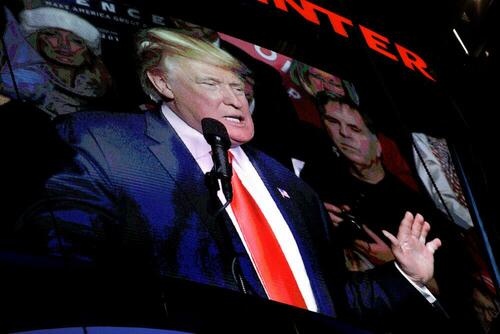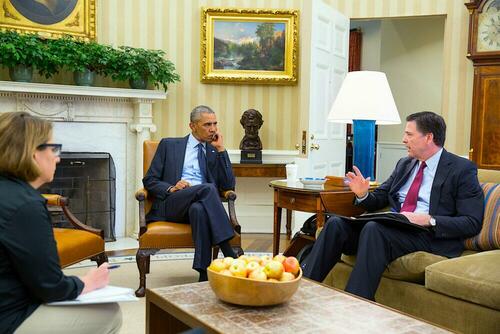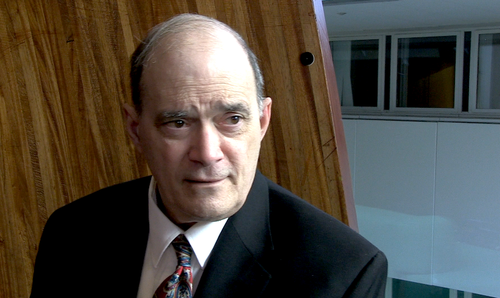
Russiagate Continues To Survive Like A Sci-Fi Monster Resilient To Bullets
Authored by Ray McGovern via Consortium News,
Russiagate continues to survive like a science fiction monster resilient to bullets.
The latest effort at rehabilitating it is an interview by Adam Rawnsley in the current issue of Rolling Stone magazine of one Michael van Landingham, an intelligence analyst who is proud of having written the first draft of the cornerstone “analysis” of Russiagate, the so-called Intelligence Community Assessment.
The ICA blamed the Russians for helping Trump defeat Hillary Clinton in 2016. It was released two weeks before Trump assumed office. The thoroughly politicized assessment was an embarrassment to the profession of intelligence.
Worse, it was consequential in emasculating Trump to prevent him from working for a more decent relationship with Russia.
In July 2018, Ambassador Jack Matlock (the last U.S. envoy to the Soviet Union), was moved to write his own stinging assessment of the “Assessment” under the title: “Former US Envoy to Moscow Calls Intelligence Report on Alleged Russian Interference ‘Politically Motivated.’”
In January 2019, I wrote the following about the ICA:
“A glance at the title of the Intelligence Community Assessment (ICA) (which was not endorsed by the whole community) — ‘Assessing Russian Activities and Intentions in Recent US Elections’ — would suffice to show that the widely respected and independently-minded State Department intelligence bureau should have been included. State intelligence had demurred on several points made in the Oct. 2002 Estimate on Iraq, and even insisted on including a footnote of dissent.
James Clapper, then director of national intelligence who put together the ICA, knew that all too well. So he evidently thought it would be better not to involve troublesome dissenters, or even inform them what was afoot.
Similarly, the Defense Intelligence Agency should have been included, particularly since it has considerable expertise on the G.R.U., the Russian military intelligence agency, which has been blamed for Russian hacking of the DNC emails.
But DIA, too, has an independent streak and, in fact, is capable of reaching judgments Clapper would reject as anathema. …
With help from the Times and other mainstream media, Clapper, mostly by his silence, was able to foster the charade that the ICA was actually a bonafide product of the entire intelligence community for as long as he could get away with it. After four months it came time to fess up that the ICA had not been prepared, as Secretary Clinton and the media kept claiming, by ‘all 17 intelligence agencies.’
In fact, Clapper went one better, proudly asserting — with striking naiveté — that the ICA writers were ‘handpicked analysts’ from only the F.B.I., C.I.A., and NSA. He may have thought that this would enhance the ICA’s credibility. It is a no-brainer, however, that when you want handpicked answers, you better handpick the analysts. And so he did.”
[See: The January 2017 ‘Assessment’ on Russiagate]
Buried in Annex B of the ICA is this curious disclaimer:
“Assessments are based on collected information, which is often incomplete or fragmentary, as well as logic, argumentation, and precedents. … High confidence in a judgment does not imply that the assessment is a fact or a certainty; such judgments might be wrong.”
Small wonder, then, that a New York Times report on the day the ICA was released noted:
“What is missing from the public report is what many Americans most eagerly anticipated: hard evidence to back up the agencies’ claims that the Russian government engineered the election attack. That is a significant omission…”
Burying Obama’s Role
Mainstream journalism has successfully buried parts of the Russiagate story, including the role played by former President Barack Obama.
Was Obama aware of the “Russian hack” chicanery? There’s ample evidence he was “all in.” More than a month before the 2016 election, while the F.B.I. was still waiting for the findings of cyber-firm CrowdStrike, which the Democratic Party had hired in place of the F.B.I. to find out who had breached their servers, Obama told Clapper and Dept. of Homeland Security head Jeh Johnson not to wait.

So with the election looming, the two dutifully published a Joint Statement on Oct. 7, 2016:
“The U.S. Intelligence Community (USIC) is confident that the Russian Government directed the recent compromises of e-mails from US persons and institutions, including from US political organizations. The recent disclosures of alleged hacked e-mails on sites like DCLeaks.com and WikiLeaks and by the Guccifer 2.0 online persona are consistent with the methods and motivations of Russian-directed efforts. These thefts and disclosures are intended to interfere with the US election process. … “
Obama’s role was revealed in 2022 when the F.B.I. was forced to make public F.B.I. emails in connection with the trial of fellow Russiagate plotter, Democratic lawyer Michael Sussmann
Clapper and the C.I.A., F.B.I., and NSA directors briefed Obama on the ICA on Jan. 5, 2017. That was the day before they gave it personally to President-elect Donald Trump, telling him it showed the Russians helped him win, and that it had just been made public.
On Jan. 18, 2017, at his final press conference, Obama used lawyerly language in an awkward attempt to cover his derriere:
“The conclusions of the intelligence community with respect to the Russian hacking were not conclusive as to whether WikiLeaks was witting or not in being the conduit through which we heard about the DNC e-mails that were leaked.”
So we ended up with “inconclusive conclusions” on that admittedly crucial point… and, for good measure, use of both words — “hacking” and “leaked.”
The tale that Russia hacked the Democratic National Committee in 2016 was then disproved on Dec. 5, 2017 by the head of CrowdStrike’s sworn testimony to Congress. Shawn Henry told the House Intelligence committee behind closed doors that CrowdStrike found no evidence that anyone had successfully hacked the DNC servers.
But it is still widely believed because The New York Times and other Democrat-allied corporate media never reported on that testimony when it was finally made public on May 7, 2020.
Enter Michael van Landingham
Rolling Stone’s article on July 28 about van Landingham says he is still proud of his role as one of the “hand-picked analysts” in drafting the discredited ICA.
The piece is entitled: “He Confirmed Russia Meddled in 2016 to Help Trump. Now, He’s Speaking Out.” It says: “Trump viewed the 2017 intel report as his ‘Achilles heel.’ The analyst who wrote it opens up about Trump, Russia and what really happened in 2016.”
Without ever mentioning that the conclusions of the ICA were proven false, by Henry’s testimony and the conclusions of Special Counsel Robert Mueller’s investigation that found no evidence of Trump-Russia “collusion,” Rolling Stone says:
“The 2017 Intelligence Community Assessment (ICA), dubbed ‘Assessing Russian Activities and Intentions in Recent U.S. Elections,’ was one of the most consequential documents in modern American history. It helped trigger investigations by the House and Senate intelligence committees and a special counsel investigation, and it fueled an eight-year-long grudge that Trump has nursed against the intelligence community.”
Rawnsley writes in Rolling Stone the following as gospel truth, without providing any evidence to back it up.
“When WikiLeaks published a tranche of [John] Podesta’s emails in late October, the link between the Russian hackers and the releases became undeniable. The dump contained the original spear phishing message that Russian hackers had used to trick Podesta into coughing up his password. News outlets quickly seized on the email, crediting it for what it was: proof that the Russians were behind the campaign.”
Because Rawnsley didn’t tell us, it’s not clear how this “spear phishing message” provides “undeniable” proof that Russia was behind it. Consortium News has contacted Rawnsley to provide more detail to back up his assertion.
Craig Murray, the former British ambassador to Uzbekistan and close friend of Julian Assange, suggested to Scott Horton on Horton’s radio show in 2016 that the DNC leak and the Podesta leak came from two different sources, neither of them the Russian government.
“The Podesta emails and the DNC emails are, of course, two separate things and we shouldn’t conclude that they both have the same source,” Murray said. “In both cases we’re talking of a leak, not a hack, in that the person who was responsible for getting that information out had legal access to that information.”
Reading between the lines of the interview, one could interpret Murray’s comments as suggesting that the DNC leak came from a Democratic source and that the Podesta leak came from someone inside the U.S. intelligence community, which may have been monitoring John Podesta’s emails because the Podesta Group, which he founded with his brother Tony, served as a registered “foreign agent” for Saudi Arabia.
“John Podesta was a paid lobbyist for the Saudi government,” Murray noted. “If the American security services were not watching the communications of the Saudi government’s paid lobbyist in Washington, then the American security services would not be doing their job. … His communications are going to be of interest to a great number of other security services as well.”
Leak by Americans
Horton then asked, “Is it fair to say that you’re saying that the Podesta leak came from inside the intelligence services, NSA [the electronic spying National Security Agency] or another agency?”
“I think what I said was certainly compatible with that kind of interpretation, yeah,” Murray responded. “In both cases they are leaks by Americans.”
William Binney, a former U.S. National Security Agency technical director, told Consortium News this regarding Rolling Stone‘s assertion about the Podesta emails:
“Saying something does not make it so. There is no evidence the phishers or hackers were Russian. In today’s networks, you really have to have the underlying internet protocol (IP nr) or device medium access control (MAC nr) to show the routing to/from [sending and receiving] devices to show exfiltration plus trace route evidence to show if that data went any further.
[In other words, you would need the unique computer addresses of the hacked and the hacker and anyone they may have relayed it to, if it were a hack.]
[Rawnsley] gives none of this type of data. So, until he provides this type of data, I view his statements as an opinion and not worth much at all.
The whole world-wide network has to have these numbers to get data from point A to point B in the world. No one (NSA included) has shown this data going to Wikileaks for publication. The 5EYES have Wikileaks under cast iron cover/analysis and would know this and report it.”

“There is one more aspect that’s important to take into account,” Binney added. “It’s the network log. This contains a record of every instruction sent on the network along with addresses for the sender and receiver. It’s held for a period of time according to storage allocated to it.”
Binney said:
“So, if there’s a hack, then the instruction to achieve the hack is in the log. Remember, Crowd Strike did the analysis of the DNC server all through this time and never talked about the network log. Now, Podesta’s computer does not have a network log, but the DNC and worldwide network providers do.”
Binney told CN that he proposed automated analysis of the worldwide log for the NSA in 1992, “but they refused it as it would expose all the money and program corruption in NSA contracts.”
Binney said he was putting that function into the ThinThread program in 1999/2000 that he was developing for the NSA, but the agency “removed it in 2001 after 9/11.”
A report by the private cybersecurity firm SecureWorks in June 2016 assessed with “moderate confidence” that a group identified as APT28, nicknamed “Fancy Bear” among other names “operating from the Russian Federation … gathering intelligence on behalf of the Russian government” was behind the Podesta phishing, though as Binney points out, the NSA found no such evidence, when it would have had to, had Russia done it.
The name “Fancy Bear” of the alleged hackers from GRU, the Russian defense intelligence agency, incidentally, was coined by Dmitri Alperovich, the anti-Putin Russian co-founder of CrowdStrike.
“This whole Russiagate affair was a concoction of the DNC, the Clintons, the F.B.I. etc. and none of them have produced any specific basic evidence to support their assertions,” Binney said. “The idea that the word ‘Bear’ implies Russia is about the level of technical intellect we are dealing with here.”
Binney said these are the key technical questions that still need to be answered:
1. What are the IP and/or MAC numbers involved? And, what are the allocations of these numbers by the Internet Assigned Numbers Authority (network number allocation authority)?
2. What are the trace routes of the hacked packets going across the worldwide network?
3. What instructions are in the network log indicating data exfiltration of data?
4. Are there any other specific technical aspects that are relevant to a potential hack? No opinions or guesses, that’s not factual evidence of anything beyond the writers biases.”
Binney said in email:
“Even if you assume the Russians did the hack and have the DNC/Podesta emails, you still have to show the transfer of these emails to Wikileaks to know who really did the deed. So far, no one has evidence the emails were sent to Wikileaks.
Most importantly, Julian Assange publicly said it was not the Russians. Kimdotcom said he helped others (not the Russians) to get data to Wikileaks. Craig Murray talked about physical transfer of data. These statements by people involved in WikiLeaks is clearly consistent with the technical evidence I and others have assembled.”
Binny said that “until such time as those others produce specific technical evidence for peer review and validation (like we have), they are just pushing sludge up an inclined plane with a narrow squeegee hoping they can get it over the top and accepted by all.”
Binney noted that the ancient Greek school of sophism called this the fallacy of repetition. “That’s where they keep repeating a falsehood over and over again till it is believed (it helps when they say the same thing from many different directions especially by people in positions of authority),” Binney said.
So the head of CrowdStrike testifies that there’s no evidence anyone hacked the DNC and according to Binney and Murray, there is no definitive proof that Russia was behind the Podesta phishing expedition either. WikiLeaks maintains that a state actor was not the source of either.
And yet the Russiagate myth persists. It is useful in so many ways for those in the U.S. who still want to ratchet up even more tension with Russia (as though Ukraine isn’t enough) and for a political party to perhaps again explain away an election loss if it happens in November.
Thanks to Bill Binney and two other VIPS very senior NSA “alumni”, and the detailed charts and other data revealed by Edward Snowden, Veteran Intelligence Professionals for Sanity (VIPS) was able to publish a memorandum on Dec. 12, 2016 that, based on technical evidence, labeled the Russian hacking allegations “baseless.” The following July we issued a similar VIPS memo, with the title asking the neuralgic question, “Was the ‘Russian Hack’ an Inside Job?” The question lingers.
Shameless or Just Dumb? Michael van Landingham brags to Rolling Stone that he wrote the first draft of the meretricious cornerstone of Russiagate, the “Intelligence Community” Assessment falsely blaming the Russians for helping Trump defeat Hillary in 2016https://t.co/1yWupvqvcg
— Ray McGovern (@raymcgovern) July 30, 2024
I have now posted an item on X to call attention to this latest Russiagate indignity.
I cannot escape the conclusion that journalism is not like war: In war the victors get to write the history; in today’s journalism, the losers — who get it wrong — get to write it.
O Tempora, O Mores!
Loading…
Originally Posted at; https://www.zerohedge.com//
Stay Updated with news.freeptomaineradio.com’s Daily Newsletter
Stay informed! Subscribe to our daily newsletter to receive updates on our latest blog posts directly in your inbox. Don’t let important information get buried by big tech.
Current subscribers:








